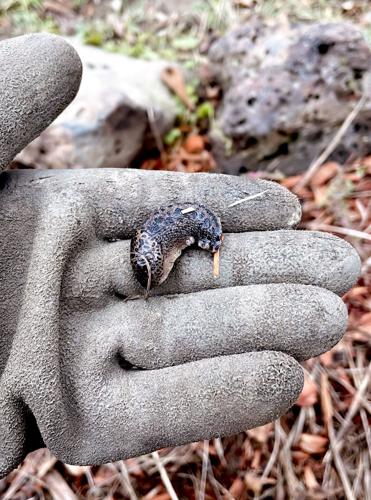Last month I found myself putzing around the garden on an overcast and rather dreary February day -- there’s something about late winter gardening that can either be cathartic or depressing, depending on how you look at it. Nobody really wants to be elbow deep in rose thorns and dirt when it’s 40 degrees outside, and honestly if the sun can’t be bothered to get out of bed, why should I?
Every year I skip the autumn garden tending because I like to leave as much foliage, cover and potential food sources for overwintering species as I possibly can – also, I’m lazy and I like to curtail as many chores as feasible.
At first, I found myself attacking this “chore” of gardening as exactly that – something I had to get done. I “had” to prune the roses, I “had” to rake the mulch, I “had” to prep the garden beds and on and on it went.
That is, until I was pruning my lilies, pulling away all the decaying leaves, mulch and organic matter that had been insulating and protecting the delicate roots of my flowers, and saw to my surprise – growth. There, nestled amid all the dead leaves, were tiny little shoots of green, a stark contrast against the browns and muted color around it.
Here’s where I felt the shift from slightly depressing to cathartic. Hopeful. Magical. Awe-inducing.
This is the point that I became spurred on by my discovery. A renewed vigor captured me, and I spent the next three hours happily chopping, clipping, raking and hauling away. At the end of it, my once chaotic and unwieldly winter garden had been transformed into a dramatically condensed version of its former self. The rose bushes were mere nubs compared to what they had been just hours before, the bushes were sheared like bad mohawks, the trees looked like little skeletons. It was ugly.
As I was pulling away the last bit of dead Crocosmias, I stumbled upon a garden visitor. It was a dark spotted slug, and I can almost hear your groan of discontent and disgust. A slug – a vermin, a good-for-nothing pest that destroys gardens, flowers and vegetables, a vexing irritant.
While you’re not wrong that slugs can, if left unchecked, destroy everything but the trees, they are still ecologically important and pretty cool little creatures. Slugs are primarily active at night and work hard at recycling; aside from your vegetables, they consume decaying food, fecal matter, fungi, lichen, earth worms and even other slugs. Most slugs will consume several times their own body weight each day and utilize their specially adapted mouth -- a tongue-like organ called a radula (Latin for "scraper") that is covered with thousands of tiny teeth called denticles. Snail poop, for lack of a better term, contains nitrogen, phosphorus, and potassium –- the three primary nutrients found in typical fertilizer. Without slugs recycling matter into nutrient-rich waste, the soil in your garden could lose many of its most important nutrients.
Admittedly, I’m not a limacologist (slug expert), but I don’t believe that the little guy I found is native to the Pacific Northwest, so I’m sure that his presence isn’t exactly welcome. However, I am, if nothing else, an advocate for the slimy and often persecuted creatures of the world, so he gets a pass today. If you have issues with slugs, please consider non-toxic alternatives and spread deterrent around the specific areas in your garden that you’d like to keep slugs out of while encouraging a non-excessive number of slugs to act as disposal and waste management in other areas of your yard.
As I sat back on my heels in the soil, holding the slug and looking around at my hacked-back vegetation, I realized that nature was giving me an important reminder. Even though the garden looked bare and ugly, it was necessary to cut everything back to allow for new growth in spring. Even something as inconsequential as a slug has an important role; while I get annoyed when my spinach and tomatoes have holes chomped out of their leaves, slugs are allowed to take up space (within reason) as well.
I was reminded of the Anne Bradstreet quote, “If we had no winter, the spring would not be so pleasant: if we did not sometimes taste of adversity, prosperity would not be so welcome.” The act of winter gardening was no longer a chore, it was something I was grateful to be doing and able to do, hopeful for another spring, and thankful for another winter.
I hope you soon find yourself putzing around your own yard or garden, unearthing excitement for spring and gratitude and for the little reminders that you might find all around you.
• Janell Shah is a wandering biologist who calls the Lower Yakima Valley home.









(0) comments
Comments are now closed on this article.
Comments can only be made on article within the first 3 days of publication.